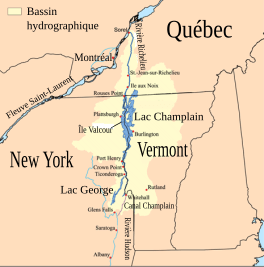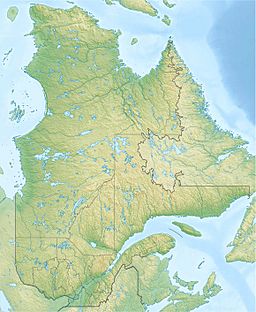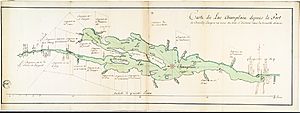Missisquoi Bay facts for kids
Quick facts for kids Missisquoi Bay |
|
|---|---|

Map of Lake Champlain with Missisquoi Bay in North-East area of the lake.
|
|
| Location | Venise-en-Québec |
| Coordinates | 45°01′12″N 73°08′42″W / 45.02000°N 73.14500°W |
| Type | Bay |
| Part of | Champlain Lake |
| Primary inflows | Rivière aux Brochets (baie Missisquoi) Pikes River (Missisquoi Bay) |
| Primary outflows | Champlain Lake and Richelieu River |
| Basin countries | |
| Max. length | 5 km (3.1 mi) |
| Max. depth | 4.75 m (15.6 ft) |
Missisquoi Bay is a large part of Lake Champlain located in the northern area. It looks a bit like a violin head! This bay is shared between Quebec in Canada and Vermont in the United States. A popular town on its shores is Venise-en-Québec, which is a favorite spot for summer fun. A river with the same name flows into the bay, and you can find the Missisquoi National Wildlife Refuge on the American side.
Where Did the Name Come From?
Champlain, who was the first governor of New France, was the first European to visit this area. The name "Missisquoi" comes from the Abenaki language. It means "a lot of waterfowl," which are birds that live near water. However, there might be other meanings too.
The name first appeared officially in a document from April 6, 1733. This document was about giving land to Paul-Louis de Lusignan Dazemard. The spelling of the name has changed many times over the years. In 1855, when areas for elections were being changed, the name Missisquoi was finally chosen for the county and the region.
How Missisquoi Bay Was Formed
About 18,000 years ago, huge sheets of ice called glaciers covered the area where the bay is now. These glaciers later melted. Around 8,000 years ago, their melting created a large body of water called the Champlain Sea.
The deepest part of Missisquoi Bay is about 4.75 meters (about 15.5 feet). The bottom of the bay is made of old marine deposits from when it was part of the Champlain Sea. The water from the bay flows south into Lake Champlain and then into the Richelieu River.
For a long time, until the late 2000s, the water in the bay didn't move much. This made the bay unhealthy. But when a new bridge was built on the U.S. side, part of the old road was taken down. This allowed fresh water from Lake Champlain to flow into the bay, making it much healthier.
Plants, Animals, and Fun Activities
Missisquoi Bay is home to many different kinds of plants and animals. You can find lots of bird species here, which is why the Missisquoi National Wildlife Refuge was created on the U.S. side. This refuge helps protect the wildlife.
The bay's beaches are very popular with people on vacation during the summer. The water is great for many activities like riding personal watercraft and boating. In the winter, when the bay freezes over, people enjoy ice fishing.
 | Percy Lavon Julian |
 | Katherine Johnson |
 | George Washington Carver |
 | Annie Easley |



